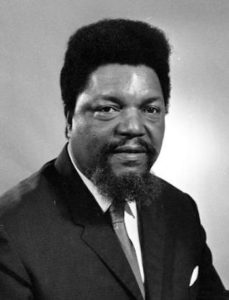
Robert F. Williams
*Robert F. Williams was born on this date in 1925. He was a Black civil rights leader and author. Robert Franklin Williams was born in Monroe, North Carolina, to Emma Carter and John L. Williams, who worked as a railroad boiler washer. He had two sisters, Lorraine Garlington and Jessie Link, and two brothers, John H. Williams and Edward S. Williams. His grandmother, a former slave of Yoruba ancestry, gave Williams his grandfather's rifle. His grandfather had been a Republican campaigner and publisher of the newspaper The People's Voice during the hard years after Reconstruction in North Carolina.
At the age of 11, Williams witnessed the beating and dragging of a Black woman by police officer Jesse Helms Sr., the father of future United States Senator Jesse Helms. Williams joined the Great Migration as a young man, traveling north for industrial work during World War II. He witnessed the 1943 Detroit race riot prompted by labor competition between whites and blacks. Drafted in 1944, he served a year and a half as a private in the then-segregated Marines before returning home to Monroe.
1947, Williams married 16-year-old Mabel Ola Robinson, a fellow civil rights activist. They had three children: John C. Williams, Robert F. Williams, Jr., and Franklin H. Williams. He is best known for serving as president of the Monroe, North Carolina chapter of the NAACP in the 1950s and into 1961. He succeeded in integrating the local public library and swimming pool in Monroe. During high racial tension and official abuses, Williams promoted armed Black self-defense in the United States. In addition, he helped gain support for gubernatorial pardons in 1959 for two young Black boys who had received lengthy reformatory sentences in what was known as the Kissing Case of 1958. It generated national and international attention and criticism of the state.
Williams obtained a charter from the National Rifle Association and set up a rifle club to defend Black people in Monroe from the Ku Klux Klan or other attackers. The local chapter of the NAACP supported Freedom Riders who traveled to Monroe in the summer of 1961 in a test of integrating interstate buses. In August 1961, he and his wife left the United States for several years to avoid kidnapping charges after a white couple got lost in the Black part of town in Monroe. The local police and the FBI allegedly convinced the couple to say Williams had kidnapped them, and the FBI put out a warrant for his arrest, causing him to flee to Cuba and, later, the People's Republic of China. The state dropped these charges when his trial opened in 1975 following his return in 1970.
Williams' book Negroes with Guns (1962) has been reprinted many times, most recently in 2013. It details his experience with violent racism and disagreement with the non-violent wing of the American Civil Rights Movement. The text was widely influential; Black Panther Party founder Huey Newton and African American Defense League founder Mauricelm-Lei Millere cited it as a major inspiration. Williams died at age 71 from Hodgkin's lymphoma on October 15, 1996. He had been living in Baldwin, Michigan.
At his funeral, activist Rosa Parks recounted her high regard for Williams. Parks gave the eulogy at Williams' funeral, praising him for "his courage and commitment to freedom." She concluded, "The sacrifices he made, and what he did, should go down in history and never be forgotten." His grandsons survived him, including Robert F. Williams III, Benjamin P. Williams, and his daughter-in-law, Melanie Williams. His wife, Mabel, lived for 18 more years after his death, dying on April 19, 2014.